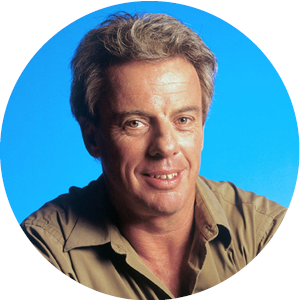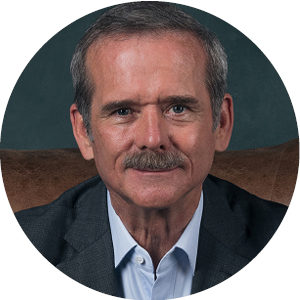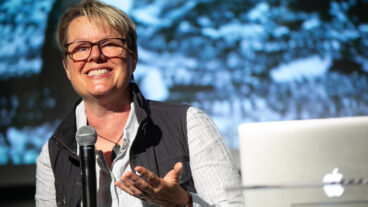Eclipse fever has taken over Eastern Canada with April 8 marking the first total solar eclipse visible in this area since 1979. And there is a reason for excitement to be this high!
While solar eclipses occur every 1.5 years, it’s rare that totality occurs in such a densely populated area — totality meaning that the moon completely blocks the face of the Sun. The next total eclipse in Canada won’t be until 2044 with visibility in Western Canada. It won’t hit Eastern Canada again for another 100 years.
We’re tracking the eclipse alongside our scientist and science journalist keynote speakers who have been counting down to this event for many weeks, as you can imagine. Check out how they’re celebrating the total solar eclipse below and hear from them directly on why this cosmic marvel is a must-see event.
Bob McDonald: Solar Eclipses are “a Humbling Experience”

“There is a saying among eclipse chasers, that ‘until you have seen a total eclipse, you haven’t seen an eclipse,’” wrote Bob McDonald in a column with CBC News. He is one of Canada’s best known science journalists and host of CBC Radio’s Quirks & Quarks.
“Having seen six in different locations around the world, I can verify that statement,” he continued. “It is a humbling experience, where the cosmos put on a spectacular show…”
Not only does the moon pass by the sun, but the whole environment changes — the sky, temperature, lighting, animals, and yes, humans. Bob has often witnessed the emotional response from those in attendance of these rare events.
Reflecting on the 2017 eclipse he attended in the US, he writes:
When totality washed over the crowd, emotional cheers, whistles, whoops, and hollers rose to an amazing crescendo, but after it ended, everyone went quiet again, as if they were processing the powerful cosmic event as if it was some kind of religious experience.
So, what happens during a total solar eclipse? Bob writes:
As the moon continues its steady progress across the sun, a darkness appears in the west. You can feel the temperature drop and the colours of objects around you become muted, turning into shades of grey. Even the chill in the air adds to the excitement that something big is about to happen.
As the last bit of sun is covered, the darkness descends like the lights in a theatre dimming before a movie begins. Birds take to the air, confused about the sudden appearance of darkness in the middle of the day… The planets Jupiter, Venus and Saturn will emerge as diamonds on either side of the sun.
Then after a few minutes, a brightness appears in the west. Any clouds in that direction suddenly glow as the shadow of the moon passes by. Overhead, the brilliance of the sun’s face returns, peeking out from behind the moon’s edge… and watch the environment come back to normal.
The show is over, but you feel a profound sense that forces beyond the Earth are at work producing a rare cosmic event that you were fortunate to be in the right place at the right time to witness.
Ziya Tong: Solar Eclipses Are a “Powerful Reminder”

Ziya Tong, an award-winning science journalist, director of the new SXSW featured film Plastic People, and the former co-host of Daily Planet, will be watching the eclipse from her home in Toronto — using special eclipse glasses, certified ISO 12312-2.
The rarity of the event demands this level of excitement she says. With most of our planet covered in water, there’s only ever a 30% chance of the eclipse being viewable from land. “That this eclipse is happening on our continent and will be seen right here in Canada is rare.”
A total solar eclipse provides us with a rare opportunity to better connect with our natural world. “It gives us a moment to reflect on the power of our nearest star,” Ziya said, “and how life on our planet is so intimately connected to it.
“If you pay attention to the animals during an eclipse, many of them will suddenly behave like it’s nighttime: birds will return to their nests, bees to their hives. When an eclipse occurs in the summer, fireflies begin flashing.
“As human beings, we are so used to being governed by clocks that an eclipse serves as a powerful reminder that, in truth, life on earth owes itself to the power of the sun.”
Dan Riskin: Solar Eclipses are a “Magical Moment”

CTV’s science and technology expert Dan Riskin is covering the solar eclipse live in Fort Erie all day. In coverage leading up to the event, Dan has been called “one of the happiest men around right now” as he cannot hide his excitement and enthusiasm.
Eastern Canada is on the path of totality for the solar eclipse meaning if you are watching the eclipse from a location within this path, you will see and experience the moon’s shadow as the moon crosses in front of the sun. The length of this experience will differ depending on where you are.
It will only take 30 minutes for the moon’s shadow to travel through Canada from it’s point of entry in Point Pelee to its exit point in Bonavista, Newfoundland. In the GTA, Dan says, we’ll likely be in the moon’s shadow for 3-3.5 minutes.
“Even if you’re not in the path of totality, even if you’re in Vancouver seeing a partial eclipse,” Dan says in a CTV segment, “it’s still freaking cool. It’s still going to be really neat to see.”
Although cloudy weather is in the forecast, there is still an opportunity to experience the magic of a solar eclipse. It will still get dark out, Dan said, and people have reported that in cloudy weather you can actually see the moon’s shadow coming towards you from the horizon, something not possible in sunny weather.
The most “magical moment” Dan is looking forward to is watching the footage captured from the camera on top of the CN Tower. At that height, he says, we’ll be able to watch the moon’s shadow travel right over Lake Ontario.
“This is really a special treat,” Dan said to CTV. “I’ve had a couple people reach out to me and say ‘I don’t get what the excitement is.’ I don’t get what the ‘I don’t get’ is. The moon is going to eat the sun, it’s going to be starlight in the middle of the day, it’s going to be unreal.”
Chris Hadfield: Solar Eclipses are “Scientifically Important“

As an astronaut, Colonel Chris Hadfield has been lucky enough to travel around the world 2650 times, and obviously, he said in an interview with CBC News, every time you go behind the world, the sun is blocked by the Earth.
“But never in my whole life have I ever had the stars or planets align so that the moon, and the sun, and the earth are lined up well enough to get a total eclipse,” Chris said. “So when I knew this one was coming… I couldn’t be happier to see such a rare and beautiful, scientific but also very thought-provoking, event.”
Chris is watching the solar eclipse from Florenceville-Bristol, New Brunswick, where he’s curious to see exactly what it looks like — how the sound changes, how the atmosphere changes, etc. — but to also see what we can learn from a scientific perspective.
“For me to watch an eclipse, it’s historically important,” Chris told CBC. “It’s rare, especially at a specific place, once every 375 years on average. It’s also fundamentally beautiful, it’s like watching an artistic thing happen, but naturally.
“It’s also scientifically important. In 1859, the sun burped — a huge blast of electromagnetic energy came screaming out of the sun in the solar wind, and it fried the Earth’s electronics. In 1859, we were just setting up telegraph cables, but telegraph machines were catching fire because we just didn’t realize the energy from the sun could affect our magnetic field so heavily.
“So, we need to know about that. It’s hard to see because it comes from the crown, the corona around the sun, but during an eclipse, the main part of the sun is blocked and you can see the corona with your naked eye, and with special telescopes and airplanes you can see the science of the sun. So that combination of personal significance, beauty and art, and then the scientific import, to me, that’s why this is so significant.”
Bring These Speakers to Your Event
You can feel the enthusiasm Bob McDonald, Ziya Tong, Dan Riskin, and Colonel Chris Hadfield have for science and the natural world in the way they talk about the solar eclipse! This enthusiasm carries over to their keynote presentations where they bring the wonders of science to their audiences.
In their awe-inspiring talks, they apply scientific insights to timely topics that today’s audiences want to hear about, from climate change and AI to leadership and team building.
Contact us to learn more about these incredible keynote speakers and how to book them for your next event.




